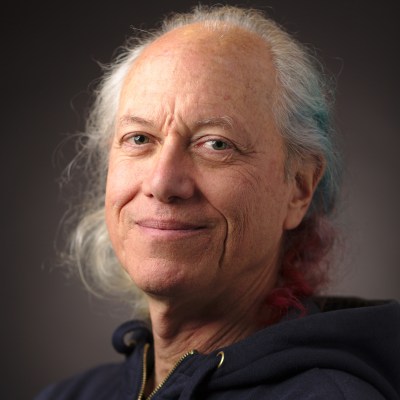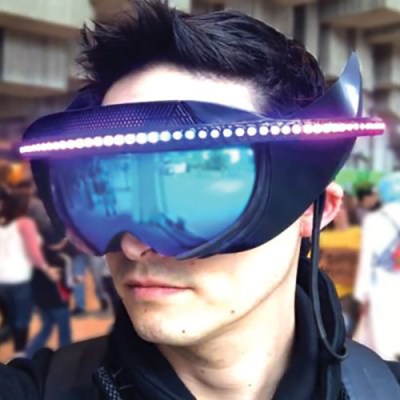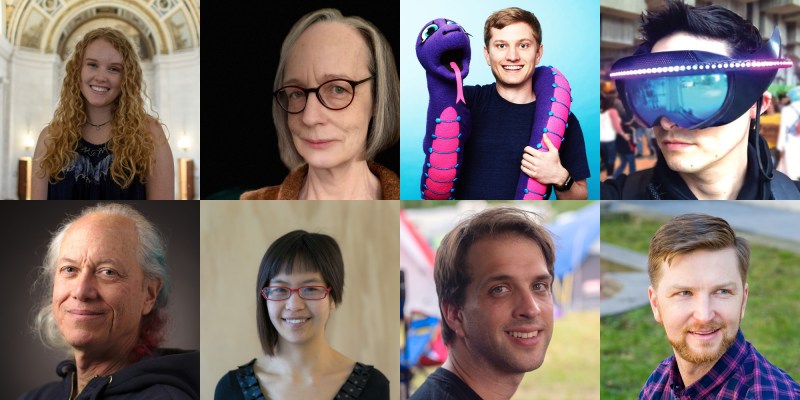The tickets have sold out even as the list of incredible speakers grows. Today we bring you the third dose of talks you’ll see at the Hackaday Superconference in November — whether you were lucky enough to grab a ticket, or will be watching the livestream, these eight will be speaking on topics from algorithmically-augmented live music performance to the hardware that captures the real world for display in VR and from leveraging the power of lookup tables to harnessing our engineering talent in a way that truly enriches humanity.
If you missed the two speaker announcements that have already come out, go back and take a look at those as well as the workshops being held during Supercon.
The Talks (Part Three of Many)

Mitch Altman
The Pros and Cons of Tech. Can We Design Tech that Serves Humanity
Technology is truly awesome! It is also a lot of fun. With the tools we, as humans, have made through the eons, we’ve become top-dog on our planet. But, at a great cost. It is mostly accepted that we have only 5 years to reverse climate change. How long till we no longer have any privacy. We have little time for anything but work because of all of our addictive and alienating “time-saving” devices we voluntarily choose to have in our lives. People report being less happy each decade. Soon, only 2% of the world’s wealth will be concentrated in only 0.1% of the population. The military uses anything and everything we create to spy, destroy, and kill for profit. This is not a pretty picture. What can we do? Is it possible to create technology to improve our lives? In this inspirational talk I will use personal experience to explore aspects of this important discussion.

Sara Adkins
Creating with the Machine: Algorithmic Composition for Live Performances
In a live concert setting, the movement and energy of performers add an important emotional element to the audience’s listening experience. Computer-generated music can achieve unique sounds and precise technique not possible by human musicians, yet it can feel alienating and impersonal due to a lack of human connection and spontaneity. “Creating with the Machine” is a set of compositions that combine algorithmic and traditional methods of music composition into live performances to explore how interactive generative algorithms can influence creativity in musical improvisation, and create a compelling listening experience for the audience. In this talk, I will introduce techniques for creating a meaningful data representation of a musician’s performance, and methods for using this input data to control a closed loop algorithmic composition.

Kate Morris
Beyond Blinky – Developing Retro-Games for PCB Badgess
So, you’ve done some badge coding, maybe using Arduino, and are looking for the next step to write interactive games using a TFT screen and some buttons and sensors? Using the open-source for the Lunar Lander badge (built for DEF CON 27) I will explain how we created the framework and how you can adapt it to write your own games for this badge or for your own conference badge. We’ll step through the process for developing a new game, and discuss some of the challenges we had in creating the Lunar Lander game.

Dave Young
Scrounging, Sipping, and Seeing Power
Powering low power and ultra-low power systems is more about system design than circuit design. Selecting the right power source, using the power effectively, and then validating that the power numbers are as expected is critical at an early stage since changes may trigger a system redesign (or product failure). I will review some of the typical design decisions to make, some general back-of-the-envelope figures, and some techniques on how to plan the power use and validate a prototype. We’ll discuss questions like: How can I decide if I should be on a primary battery, solar, or kinetic energy system? How can I estimate the total usable energy from a solar panel given real-world conditions? Do I need MPPT? And how can I estimate my total energy consumption?

Ruth Grace Wong
How to become a manufacturing engineer in your spare time
It’s one thing to prototype something for yourself, and entirely another to productionize a product for manufacturing. This talk is about my quest to become a manufacturing engineer. In the summer of 2016, I decided that I would do software at scale at my full time job, and hardware and objects at scale in my spare time. Since then, I’ve worked on many personal projects to get the intuitive physical feel for how things are made while documenting what I’ve learned, started writing about manufacturing for Supplyframe Hardware allowing me to tour factories and interview manufacturers, and started working part-time as a manufacturing engineer.

Kim Pimmel
Beyond the Rectangle: Building Cameras for the Immersive Future
Ever since the earliest days of photography, we’ve tried to capture and play back the world around us. Today, immersive technologies like AR and VR are pushing beyond the 2D image, seeking to replicate more and more of the human experience. This is driving growth in new imaging, sensory, and display technologies.
- Learn about some cameras I’ve made, trends in camera technology, and how building the Matrix is hard.

Scott Shawcroft
Supercharge Your Hardware (Old and New) with CircuitPython
CircuitPython makes programming hardware easier than ever by bringing the popular Python language to modern, inexpensive 32-bit microcontrollers. This doesn’t need to be limited to modern hardware though. By pairing a modern microcontroller running CircuitPython and a vintage computer, such as a GameBoy or Yamaha piano keyboard, you can unlock the unique characteristics of these vintage devices. In this talk, you’ll learn the basics of how CircuitPython makes coding easy, how it works under the hood, and how to extend CircuitPython with C. As an example, we’ll supercharge a Nintendo’s GameBoy with CircuitPython. By the end of the talk, you’ll be able to supercharge your own hardware project with CircuitPython.

Charles Lohr
Accomplishing the Impossible with LUTs.
- I’ve done some very bizarre and extreme things with microcontrollers over the last several years. From bit-banging (Tx and Rx) Ethernet on an ATtiny85 broadcasting video from an ESP8266 GPIO pin to writing USB stacks for chips that don’t have them, the most insane and counter-intuitive projects that have been successes have all had one thing in common. At the heart of the project is one or more lookup tables (LUTs). In computer science classes, we study algorithms like Dynamic Programming and we hear about LUTs, but we rarely discuss the true power of this game-changing tool. In this talk I will explore how to reform complicated problems in such a way to do processing faster and on smaller processors than you ever thought possible.
See You at Supercon!
We’re so excited to see everyone at Supercon this year. As mentioned above, tickets are sold out so if something comes up and you can’t make it, please request a ticket refund so we can make your spot available to people on the waitlist.
















